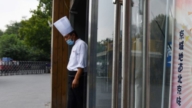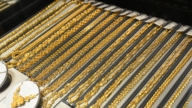【新唐人2013年08月22日訊】鋼貿貸款風險在中國已經持續多年,許多銀行身陷其中。中國鋼貿企業至少三分之二位於上海,而上海鋼貿企業的未償貸款,去年底總計大約1,800億元人民幣。除了上海是重災區之外,江蘇最近也新增不良貸款182億元,成為同期中國新增不良貸款最多的省份。
有專家認為,中國經濟放緩,造成很多行業都存在產能過剩問題,其中包括鋼鐵。分析指出,這和中共當局主導的刺激經濟政策有很大的關係。專家估計,未來將會曝光越來越多融資黑洞。
大陸《21世紀經濟報導》最近了解到,江蘇省有10名銀行支行長,因為鋼貿市場融資黑洞被撤職或追究法律責任,包括工商銀行、建設銀行、交通銀行以及省內的江蘇銀行等,多家金融機構在內。
報導顯示,江蘇新增不良貸款在今年1-6月就達到了182億元,其中鋼貿市場是這些不良貸款的主要集中領域。
美國南卡羅萊納大學艾肯商學院教授謝田:「同時有10家支行同時在參與,這對銀行來說也是非常危險的,因為如果這個交易有風險,或者風險很大或破產的話,那等於同時把10家支行給帶下去了,這是一件令人非常詫異的是中國這些融資平臺,居然有那麼多不為人知的內幕。」
經濟評論家傑森:「鋼材的產能過剩,隨著中國經濟的放緩,世界的需求下降或持平,中國的鋼鐵產能過剩只會越來越嚴重,最終就是銀行當時貸的款收不回來,就成了壞帳。」
據了解,大陸鋼貿市場採取多種加強擔保方式,來符合銀行的貸款要求。其中通過向鋼材市場繳納保證金,尋求鋼材市場提供保證擔保的「聯保互保」融資模式,得到了銀行的認可。
資料顯示,鋼貿行業從2000年開始採用「聯保互保」的融資模式。到2009年這一融資模式達到頂峰。大批的鋼貿商可以輕易的從銀行那裏獲得抵押貸款,甚至重復抵押。2011年,中國鋼材貿易貸款1.89萬億元,同期全國貸款總額54萬億元。鋼材貿易貸款在整個銀行貸款中的比例高達3.5%。
傑森:「實際上這都是中共中央對於GDP的飢渴,高GDP飢渴的一種展現,但是這個過程中,卻出現了一些利益集團之間的博奕,比如地方政府的利益,在一定層面上和中央政府的利益,就出現了分裂,那麼這幾個銀行行長,就成了一個利益集團之間博弈的犧牲品。」
《21世紀經濟報導》顯示,截至今年上半年,江蘇鋼貿市場不良貸款餘額為213億元,不良貸款率為42.3%,較年初上升23.3個百分點,而江蘇5家大型銀行上半年新增不良貸款中,鋼貿貸款就佔了55.8%。
中共國家審計署7月28號發表公告聲稱,已經開始組織全國審計機關對政府性債務進行審計。
美國南卡羅萊納大學艾肯商學院教授謝田估計,未來幾個月,可能會有更多的融資黑洞
被曝光出來。
謝田:「一旦追查到融資平臺的時候,類似這種風險極大或者是沒有足夠的擔保、不符合程序,和涉及到行賄受賄,所有這些不法違規的現象,可能都會一一暴露出來。我想現在各省市縣那些地方政府,涉及融資平臺的人員,很可能現在緊鑼密鼓的在準備後事了,甚至準備逃跑都有可能。」
根據上海一名鋼貿商負責人透露,現在有不少鋼貿老闆跑路了,抵押物也不要。因為現在鋼材價格跌到谷底,貸款又已經拿到,鋼材就留給銀行處理。何況,這些鋼貿商的一批貨物被反覆抵押不知道有多少次了。
採訪/陳漢 編輯/黃億美
Disasters from China’s Hunger for GDP
Many banks in China are trapped in risky loans to
the steel trade industry.
At least two third of China’s steel trade industry
is located in Shanghai.
In 2012, the hardest hitting year, outstanding loans to the
steel industry in Shanghai reached a total of 180 billion yuan.
In addition to Shanghai, Jiangsu’s new non-performing loans
(NPL) recently reached 18.2 billion yuan, and Jiangsu became
the province with the largest new NPL.
Some experts believe that China’s economic slowdown
has resulted in overcapacity in many industries, including steel.
Analysis pointed out it had a lot to do with the economic
stimulus policies of the Chinese Communist Party (CCP.)
Experts estimate that more financial black holes
will be exposed in the near future.
Mainland’s 21st Century Economic Report recently showed
10 bank directors in Jiangsu Province have been removed
or held legally responsible over steel trade financial
black holes, including those at the Industrial and Commercial
Bank of China, Construction Bank, Bank of Communications
and Bank of Jiangsu province.
Reports indicate that during the first 6 months of 2013,
Jiangsu new NPL reached 18.2 billion yuan.
Of these, the bad loans from the steel trade market
were the main focus.
Professor Xie Tian, Aiken School of Business, University
of South Carolina: “Simultaneous involvement of 10 banks
is very dangerous for the banking industry.
If anything or bankruptcy should happen, 10 banks
will go down together.
I am very surprised to learn of these unknown stories."
Economic commentator Jason Ma: “With the slowdown
in China’s economy and declining world demand,
steel overcapacity in China will only be worsened.
Ultimately, bank loans cannot be paid back
and turn into bad debts."
It is understood that the Mainland China steel market uses
multiple protection models to meet the banks’ lending requirements.
By paying a deposit to the steel market, steel merchants
can obtain the steel market’s mutual protection, which has been recognized by banks.
Statistics show that the steel trade industry began
to use mutual protection since 2000.
Many steel enterprises can easily obtain loans from
banks in this case.
In 2011, China’s steel trade loans were 1.89 trillion,
which was 3.5% of the total national loans of 54 trillion yuan.
Jason Ma: “In fact, this is the manifestation of the CCP’s
hunger for GDP.
During this process, many interested groups fought
for profits, such as the central government against
local governments, and conflicts followed.
These dismissed bankers unfortunately became victims."
21st Century Economic Report shows that during the first
six months of 2013, NPL of Jiangsu steel trade market
amounted to 21.3 billion yuan.
NPL ratio was 42.3%, up 23.3 percent compared with
the beginning of 2013.
Among the five largest banks in Jiangsu, NPL’s
from the steel trade market accounted for 55.8%.
On July 28, the National Audit Office announced that it had
already started to organize a national audit of government debt.
Professor Xie Tian estimates that many financial black holes
will be exposed in the coming months.
Xie Tian: “Regarding finance, taking a great risk or lack
of adequate security goes against lending procedures
and may involve administrative bribery.
All these violations may be exposed.
I believe people who are involved with finance
in local governments are preparing for the worst.
Many of them may be ready to flee."
According to a responsible person in Shanghai’s steel trade,
many bosses in the steel industry have already walked away,
leaving their collateral behind.
Right now, steel prices have hit bottom.
Since they have the loans in their hands, they leave
their steel goods to the bank to deal with.
Some steel goods have been repeatedly used
as collateral several times.




























